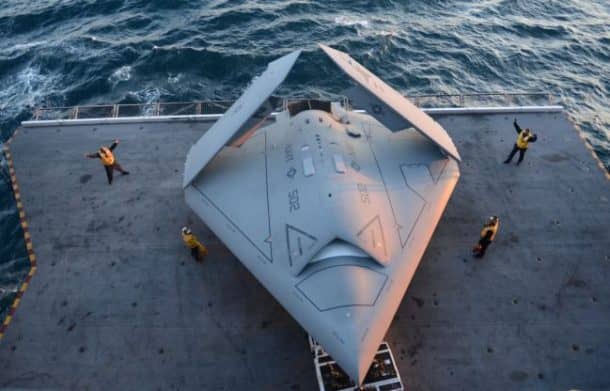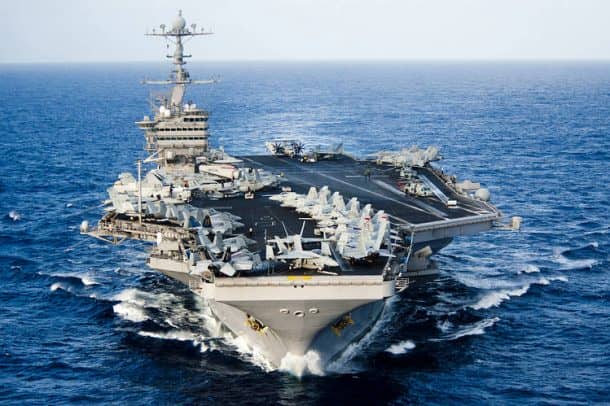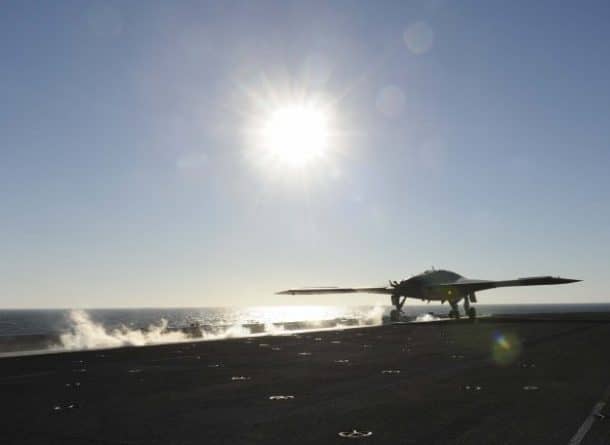The US Navy has designed a new air refuelling drone called MQ-25A Stingray (as it looks like a metallic stingray) to increase the combat range of carrier aircraft assets like the F-35C Joint Strike Fighters and F/A-18 Super Hornets.

The US Navy intends to curb the emerging threat of enemy anti-ship missiles by engineering an unmanned refuelling stealth-tank that will be launched from the carrier deck to refuel the fighter jets on mission flights aerially. This tanker is part of the Anti-Access program by Pentagon to combat the anti-ship missiles. These missiles are precision guided, long-ranged, and have become increasingly successful in taking down the aircraft carriers as far as 900-1000 miles off shore.
“MQ-25A Stingray will help to preserve the power projection dominance of the nation’s carrier fleet. MQ-25A Stingray is the next step in the Navy’s evolutionary integration of unmanned air systems into the carrier strike group’s operational environment. As part of our incremental approach this will allow the Navy to deliver carrier-based unmanned capability to the fleet faster,” said Jamie Cosgrove, Navair Spokeswoman.
Why Was This Refueling Drone Needed?
The high combat range of the F-35C or F/A-18 fighter jets is essential. If they can, for example, only cover a distance of 500-600 miles for an attack or air-defense, what will they do if the threat is about a thousand miles offshore? This new aerial refuel tanker is the solution to this problem. The MQ-25A Stingray can refuel these fighter jets en-route and in mid-air, providing stealth and endurance for longer distances.

The Stealth Factor
The existing refuel tankers, like the Air Force’s KC-46A, has a large fuselage and consequently a large radar signature, making it quite vulnerable to detection and attack. MQ-25A Stingray is, therefore, a stealthy drone that can dodge the enemy radar and complete aircraft refueling as well.
“When fielded, MQ-25A Stingray will deliver a high-endurance organic aerial refueling and ISR capability. Unmanned aerial refueling will extend the performance, efficiency and safety of manned aircraft and impart longer range and greater endurance to enable the execution of missions that otherwise could not be performed,” Cosgrove added.

Aerial Refueling Is Essential For Carriers In Future
This new aerial refuelling drone has entered in the field of military tech, but the evolution and trajectory of aircraft carriers is still under discussion. Many experts believe that carrier jets will soon become useless in the wake of weapons like the DF-21D and hypersonic attacks. If the carriers cannot cover long distances, they must be replaced with smaller and agiler ships to carry drones and jets.
The MQ-25A Stingray is currently developing under Unmanned Carrier Launched Airborne Surveillance and Strike system, UCLASS, a drone program. It has already experimented with the demonstrator aircraft called X-47B, and has successfully taken off and landed on the carrier. Further development requires to operate it with an actual aircraft and later attempt aerial refuelling mid-journey. Watch the video below for more details.
Greater stealth, check! Greater endurance, check! The efficiency of fighter jets, check! This is what MQ-25A Stingray will accomplish once it has been fully developed.
Let us know what do you think about this new drone technology. Comment below!


